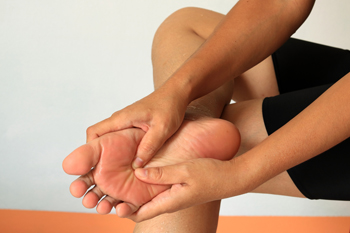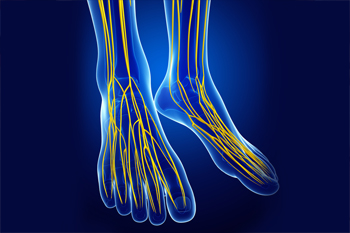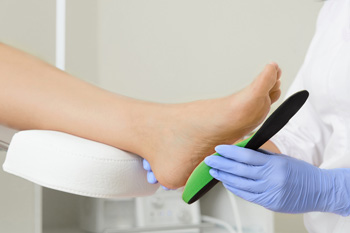
 Metatarsalgia is a common foot condition characterized by pain in the front of the foot. When the metatarsal bones are exposed to high levels of stress, they can become inflamed. This leads to symptoms such as sudden or gradually worsening pain in the front of the foot, and burning, aching, shooting, tingling, or a numb sensation in the foot. Metatarsalgia is often associated with other foot conditions, including Morton’s neuroma, metatarsophalangeal synovitis, avascular necrosis, sesamoiditis, and inflammatory arthritis. While anyone can develop this condition, athletes who enjoy running or other high impact sports may be more susceptible. If you have pain in the front of one or both of your feet, please seek the counsel of a podiatrist who can diagnose and treat this ailment.
Metatarsalgia is a common foot condition characterized by pain in the front of the foot. When the metatarsal bones are exposed to high levels of stress, they can become inflamed. This leads to symptoms such as sudden or gradually worsening pain in the front of the foot, and burning, aching, shooting, tingling, or a numb sensation in the foot. Metatarsalgia is often associated with other foot conditions, including Morton’s neuroma, metatarsophalangeal synovitis, avascular necrosis, sesamoiditis, and inflammatory arthritis. While anyone can develop this condition, athletes who enjoy running or other high impact sports may be more susceptible. If you have pain in the front of one or both of your feet, please seek the counsel of a podiatrist who can diagnose and treat this ailment.
Foot Pain
Foot pain can be extremely painful and debilitating. If you have a foot pain, consult with one of our podiatrists from Achilles Foot Clinic. Our doctors will assess your condition and provide you with quality foot and ankle treatment.
Causes
Foot pain is a very broad condition that could be caused by one or more ailments. The most common include:
Diagnosis
To figure out the cause of foot pain, podiatrists utilize several different methods. This can range from simple visual inspections and sensation tests to X-rays and MRI scans. Prior medical history, family medical history, and any recent physical traumatic events will all be taken into consideration for a proper diagnosis.
Treatment
Treatment depends upon the cause of the foot pain. Whether it is resting, staying off the foot, or having surgery; podiatrists have a number of treatment options available for foot pain.
If you have any questions, please feel free to contact one our office, located in the South of Calgary, Alberta. We offer the newest diagnostic and treatment technologies for all your foot care needs.
 Damage to the nerves in the hands and feet is known as neuropathy. Generally, neuropathy causes a loss of sensation and feeling in the toes which affects the ability to feel pain or temperature. Other common symptoms of neuropathy include numbness or tingling, a burning and stabbing pain, and weakness in the affected area. While neuropathy’s most common cause is diabetes, it can also be caused by inflammatory diseases, kidney problems, and vitamin deficiencies. Because of this, diabetic patients should also have regular checkups with a podiatrist to monitor the potential development of neuropathy. Any patient who believes that they are experiencing symptoms of neuropathy should consult with a podiatrist for a proper diagnosis and treatment method.
Damage to the nerves in the hands and feet is known as neuropathy. Generally, neuropathy causes a loss of sensation and feeling in the toes which affects the ability to feel pain or temperature. Other common symptoms of neuropathy include numbness or tingling, a burning and stabbing pain, and weakness in the affected area. While neuropathy’s most common cause is diabetes, it can also be caused by inflammatory diseases, kidney problems, and vitamin deficiencies. Because of this, diabetic patients should also have regular checkups with a podiatrist to monitor the potential development of neuropathy. Any patient who believes that they are experiencing symptoms of neuropathy should consult with a podiatrist for a proper diagnosis and treatment method.
Neuropathy
Neuropathy can be a potentially serious condition, especially if it is left undiagnosed. If you have any concerns that you may be experiencing nerve loss in your feet, consult with one of our podiatrists from Achilles Foot Clinic. Our doctors will assess your condition and provide you with quality foot and ankle treatment for neuropathy.
What Is Neuropathy?
Neuropathy is a condition that leads to damage to the nerves in the body. Peripheral neuropathy, or neuropathy that affects your peripheral nervous system, usually occurs in the feet. Neuropathy can be triggered by a number of different causes. Such causes include diabetes, infections, cancers, disorders, and toxic substances.
Symptoms of Neuropathy Include:
Those with diabetes are at serious risk due to being unable to feel an ulcer on their feet. Diabetics usually also suffer from poor blood circulation. This can lead to the wound not healing, infections occurring, and the limb may have to be amputated.
Treatment
To treat neuropathy in the foot, podiatrists will first diagnose the cause of the neuropathy. Figuring out the underlying cause of the neuropathy will allow the podiatrist to prescribe the best treatment, whether it be caused by diabetes, toxic substance exposure, infection, etc. If the nerve has not died, then it’s possible that sensation may be able to return to the foot.
Pain medication may be issued for pain. Electrical nerve stimulation can be used to stimulate nerves. If the neuropathy is caused from pressure on the nerves, then surgery may be necessary.
If you have any questions, please feel free to contact one our office, located in the South of Calgary, Alberta. We offer the newest diagnostic and treatment technologies for all your foot care needs.
 Orthotics are shoe inserts made in order to relieve pain resulting from a foot condition such as corns and calluses, tendonitis, bunions, heel pain, or recurring stress fractures. Orthotics can be made of a variety of materials that include rubber, plastic, leather or even metal. While many orthotics can be purchased over the counter, they can also be custom made by a podiatrist for a specific issue. A podiatrist will account for the function and structure of the foot as well as its biomechanics to help determine what the best fit is for each patient. Patients who are interested in getting orthotics should consult with their podiatrist, who will be able to either prescribe custom orthotics or suggest which over the counter orthotics will work best.
Orthotics are shoe inserts made in order to relieve pain resulting from a foot condition such as corns and calluses, tendonitis, bunions, heel pain, or recurring stress fractures. Orthotics can be made of a variety of materials that include rubber, plastic, leather or even metal. While many orthotics can be purchased over the counter, they can also be custom made by a podiatrist for a specific issue. A podiatrist will account for the function and structure of the foot as well as its biomechanics to help determine what the best fit is for each patient. Patients who are interested in getting orthotics should consult with their podiatrist, who will be able to either prescribe custom orthotics or suggest which over the counter orthotics will work best.
If you are having discomfort in your feet and would like to try orthotics, contact one of our podiatrists from Achilles Foot Clinic. Our doctors can provide the care you need to keep you pain-free and on your feet.
What Are Orthotics?
Orthotics are inserts you can place into your shoes to help with a variety of foot problems such as flat feet or foot pain. Orthotics provide relief and comfort for minor foot and heel pain but can’t correct serious biomechanical problems in your feet.
Over-the-Counter Inserts
Orthotics come in a wide variety of over-the-counter inserts that are used to treat foot pain, heel pain, and minor problems. For example, arch supports can be inserted into your shoes to help correct overarched or flat feet, while gel insoles are often used because they provide comfort and relief from foot and heel pain by alleviating pressure.
Prescription Orthotics
If over-the-counter inserts don’t work for you or if you have a more severe foot concern, it is possible to have your podiatrist prescribe custom orthotics. These high-quality inserts are designed to treat problems such as abnormal motion, plantar fasciitis, and severe forms of heel pain. They can even be used to help patients suffering from diabetes by treating foot ulcers and painful calluses and are usually molded to your feet individually, which allows them to provide full support and comfort.
If you are experiencing minor to severe foot or heel pain, it’s recommended to speak with your podiatrist about the possibilities of using orthotics. A podiatrist can determine which type of orthotic is right for you and allow you to take the first steps towards being pain-free.
If you have any questions, please feel free to contact one our office, located in the South of Calgary, Alberta. We offer the newest diagnostic and treatment technologies for all your foot care needs.
 The Achilles tendon is an integral part of having mobility in everyday activities. It is located in the back of the leg, and connects the calf muscles to the heel. It is considered to be the strongest tendon in the body, but can still become injured and cause pain. Injuries can happen as a result of playing sports, suddenly stepping off of a curb, or wearing high heels over an extended period of time. Many patients can endure a partial tear, which may occur from an Achilles tendon that has gradually become weak. A complete tear will most likely make walking impossible and immediate treatment is recommended. If you have experienced any type of injury to your Achilles tendon, please consult with a podiatrist who can effectively treat this condition.
The Achilles tendon is an integral part of having mobility in everyday activities. It is located in the back of the leg, and connects the calf muscles to the heel. It is considered to be the strongest tendon in the body, but can still become injured and cause pain. Injuries can happen as a result of playing sports, suddenly stepping off of a curb, or wearing high heels over an extended period of time. Many patients can endure a partial tear, which may occur from an Achilles tendon that has gradually become weak. A complete tear will most likely make walking impossible and immediate treatment is recommended. If you have experienced any type of injury to your Achilles tendon, please consult with a podiatrist who can effectively treat this condition.
Achilles tendon injuries need immediate attention to avoid future complications. If you have any concerns, contact one of our podiatrists of Achilles Foot Clinic. Our doctors can provide the care you need to keep you pain-free and on your feet.
What Is the Achilles Tendon?
The Achilles tendon is a tendon that connects the lower leg muscles and calf to the heel of the foot. It is the strongest tendon in the human body and is essential for making movement possible. Because this tendon is such an integral part of the body, any injuries to it can create immense difficulties and should immediately be presented to a doctor.
What Are the Symptoms of an Achilles Tendon Injury?
There are various types of injuries that can affect the Achilles tendon. The two most common injuries are Achilles tendinitis and ruptures of the tendon.
Achilles Tendinitis Symptoms
Rupture Symptoms
Treatment and Prevention
Achilles tendon injuries are diagnosed by a thorough physical evaluation, which can include an MRI. Treatment involves rest, physical therapy, and in some cases, surgery. However, various preventative measures can be taken to avoid these injuries, such as:
If you have any questions, please feel free to contact one our office, located in the South of Calgary, Alberta. We offer the newest diagnostic and treatment technologies for all your foot care needs.